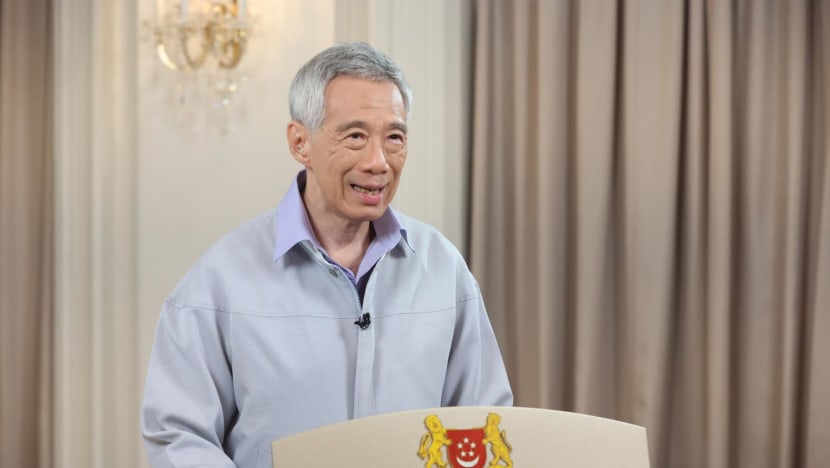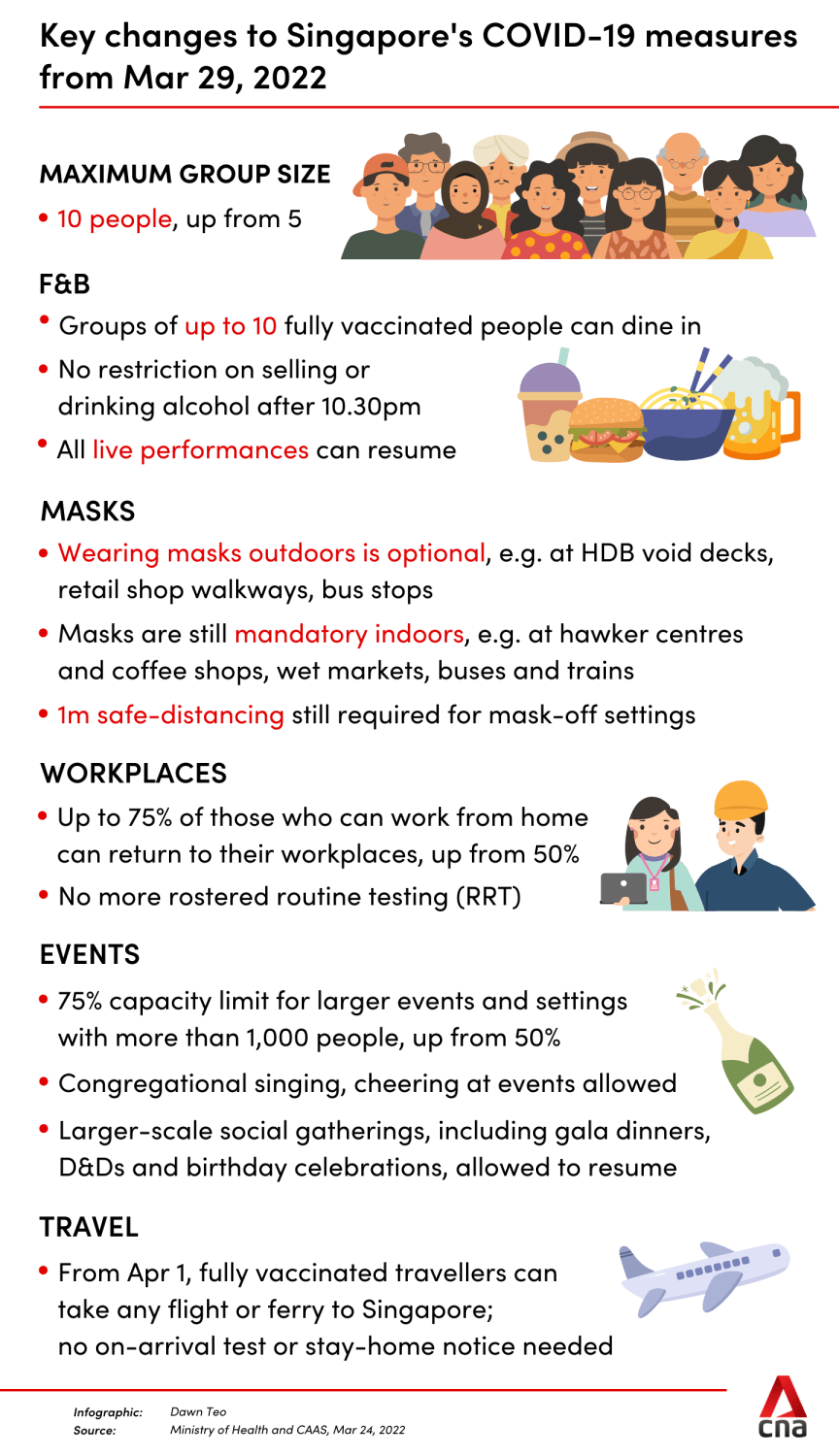Group sizes doubled to 10 people, optional to wear masks outdoors as Singapore takes 'decisive step' in living with COVID-19

Prime Minister Lee Hsien Loong addresses the nation on the COVID-19 situation on Mar 24, 2022. (Photo: Ministry of Communications and Information)
SINGAPORE: Singapore will raise the size of group gatherings from five to 10 people and make mask-wearing outdoors optional from Tuesday (Mar 29), announced Prime Minister Lee Hsien Loong on Thursday as part of the country’s “decisive step forward” towards living with COVID-19.
Other changes to the country's safe management measures include allowing up to 75 per cent of employees who can work from home to return to their workplace, and raising the capacity limit for larger events to 75 per cent.
It will remain mandatory for people to wear a mask indoors, although donning one outdoors will be optional as the risk of outdoor transmission is “significantly lower”, said Mr Lee in a televised address to the nation.
Safe distancing requirements – keeping a 1m distance between groups where masks are off – will remain in place for now to minimise transmission in mask-off settings.
Concurrently, Singapore will ease cross-border travel “substantially” with the Omicron situation “well under control”, said Mr Lee.
Testing and quarantine requirements for travellers will be “drastically” streamlined, he added, noting that a simplified Vaccinated Travel Framework will let Singaporeans travel abroad “almost like before COVID-19”.
Such a framework will also lift most restrictions for fully vaccinated visitors entering Singapore.
"This will reconnect Singapore with the world. It will give a much-needed boost to businesses, particularly the tourism sector, and help Singapore reclaim its position as a business and aviation hub,” he said.
But while the domestic and cross-border changes represent “a major step” towards living with COVID-19, Mr Lee said they “stop short of a complete opening up”.
“We remain watchful because COVID-19 may yet bring further surprises.”
With that, the Prime Minister urged Singaporeans to take the latest easing in COVID-19 measures “in the right spirit”.
“Resume more normal lives, enjoy larger gatherings of family and friends, go outdoors without masks, or reunite with loved ones abroad. But do not throw all caution to the wind,” he said.
Mr Lee called on everyone to continue playing their part by complying with the revised safety protocols.
“If you feel ill, test yourself. If you test positive, isolate yourself at home. If you test negative, and decide to go out, please wear a mask to protect others, even outdoors, just in case,” he said.
“Let us all continue to exercise personal and social responsibility,” he added.
“That way, even when new problems arise, we stand a much better chance of keeping things under control and staying on the path to a new normal.”

“DECISIVE STEP FORWARD”
Earlier in his speech, Mr Lee recounted Singapore’s journey in coping with COVID-19 over the past two years.
“This has been a tough fight. With each new wave, we had to move quickly and adapt. Every time we thought we had the pandemic under control, the virus surprised us,” he said.
The latest curveball came in the form of the more-infectious Omicron variant, which saw daily infections here going up sharply – exceeding 25,000 in a day at its peak.
Given the country’s high vaccination rate and strong healthcare system, Singapore was “quietly confident” that it could cope, said Mr Lee. But to give its healthcare system and workers time to respond, it decided to tighten border measures and held back the easing of safety protocols.
“We were relieved that Omicron turned out less severe than earlier variants, and that relatively few cases were serious enough to need oxygen support or ICU care,” said Mr Lee.
He said daily new cases have been coming down over the last two weeks, with the week-on-week ratio now around 0.8.
"At this rate, the number of daily infections will halve in about three weeks,” he added.
These have been achieved through a collective effort – from the public who did their part to businesses and essential workers who kept the economy and social services going.
Mr Lee also paid tribute to the country's healthcare workers and thanked them for making “tremendous sacrifices”, at a heavy personal cost”.
“Because of you, we have maintained some semblance of normalcy in the past two years. Some countries have seen mass resignations of healthcare workers,” he said.
“But our healthcare team, doctors and nurses stayed at their posts and kept on performing their duties.
“So to our healthcare and frontline workers, from the bottom of my heart, and on behalf of a grateful nation, I want to say: Thank you!”
Singapore is now at “a major milestone” in its COVID-19 journey, with an overwhelming majority of the population fully vaccinated and nearly everyone eligible having received a booster shot.
The Omicron wave is “subsiding”, he added, noting that the country also has "stronger immunity" as many in the population have also been exposed to the virus and recovered.
Crucially, the healthcare system – which was “under considerable stress” at the peak of the Omicron wave – has remained resilient, said Mr Lee.
“In judging how far and fast to ease restrictions, we are very mindful not to stress our healthcare workers and system to breaking point,” he said.
“We must not place an impossible burden on the healthcare workers, and endanger many COVID-19 and non-COVID-19 patients who urgently need treatment.”
At the same time, the country also must weigh the cost that stringent safety measures have on businesses and the economy, as well as the impact on children needing to learn, youths yearning to interact, families seeking to bond and communities striving to connect.
“Taking all things into consideration, we believe that we are now ready to take a decisive step forward towards living with COVID-19,” he said.

















